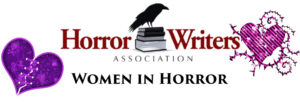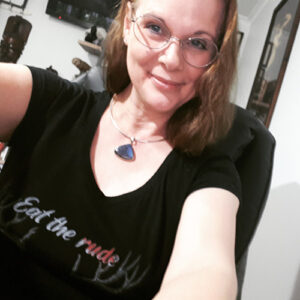Women in Horror: Interview with Lauren Elise Daniels

 What inspired you to start writing?
What inspired you to start writing?
My parents said I could read anything I wanted, so long as we discussed it. That tactic had me reading collections like The Fourth Galaxy Reader edited by H. L. Gold, and the novels Dragon’s Egg by Robert L. Forward and Stephen King’s Firestarter—and trying to move things with my mind—before I was twelve.
I also had a stutter but when I wrote, I was free. I could use any language I wanted without getting tangled in the briar of certain vowel and consonant combinations. Then, I found I could conjure justice in my endings. When I was about twelve, I wrote about a trophy hunter who’s eaten by one of his captives—a saltwater crocodile. That was delicious, and just the beginning.
What was it about the horror genre that drew you to it?
What was it about the horror genre that drew you to it?
We joke that my father is to blame. Dad and I watched films like Audrey Rose, Invasion of the Body Snatchers, and The Thing. He educated me about allusions to McCarthyism, highlighted the environmental messaging in Wolfen, and was vocal when waitstaff were gobbled up at the party in Alligator rather than the wealthy characters throwing the bash. He’s the one who linked horror with psychology and societal issues for me.
Do you make a conscious effort to include female characters and themes in your writing and if so, what do you want to portray?
Yes, female characters drive my stories. The women in my family and wider circle are fierce and I aim to portray them honestly. It’s been my experience that we women have to protect ourselves and solve our own problems. We must confront and circumvent many internal and external parasites and predators routinely. I come from women who endured—with some of them seeing very little of the American Dream but saved for their children. I’m determined to capture the essence of these truths in my characters.
What has writing horror taught you about the world and yourself?
Recently, I’ve been focusing on meeting the gaze of the women in my ancestry. They worked on farms and in factories and took in extra sewing they did in a bad light for pennies while their husbands were naïve about their secret, agonizing attempts to control their fertility.
Writing with the goal of reaching the ancestors is like nothing else, and horror is perfect for this process, considering the battles they fought at home and at work. They seem to fill the room and there are beautiful synchronicities around my research. I’ve learned that everything we have now, we owe to the line standing behind us. I’ve also learned that when I take one step toward these personalities, they bound generously toward me. They want their stories told. However, I can do it, and I get vibes when I’m veering off the path. I’ve learned to steer little and to cooperate more.
How have you seen the horror genre change over the years? And how do you think it will continue to evolve?
When I was studying for my BA and MFA in the 1980s and 1990s, I was actively discouraged from writing horror. Now, horror wins mainstream awards because of its ability to wrench open the sealed doors within our communities and within us. Horror can reveal our connections to each other and to our buried, sidelined selves. I hope horror will continue to roam the borderlands of the contested, colonized, and marginalized.
How do you feel women have been represented thus far in the genre and what hopes do you have for representation in the genre going forward?
Some writers like Stephen King with Carrie and Beverly in IT and Misery’s Annie Wilkes have always had complex characters in their repertoire, but it wasn’t the standard. Even the horror movies of my childhood showcased women who were flat, helpless screamers who couldn’t claw their way out of a paper bag. For the future, I want to see women as flawed, layered, selfish, motivated, subversive, and with plenty of errors in judgment—just like us.
Who are some of your favorite female characters in horror?
I’ve been gobbling up short stories lately, so anything edited by Rebecca Rowlands, Lindy Ryan and Sara Tantlinger is brilliant. I’m also currently reading Tamika Thompson’s Unshod, Cackling, and Naked. All of her female protagonists give me goosebumps.
For film, I’ll never get over Matilda Anna Ingrid Lutz’s Jennifer in the 2017 film Revenge, who felt to me like the embodiment of the Erinyes within a realistic context. Madeline McGraw’s Gwen in 2022’s Black Phone is refreshing as a portrayal of an insistent, disobedient and fierce character—who’s gifted and so right.
Who are some women who write horror you recommend our audience check out?
Geneve Flynn, Pamela Jeffs, Faye Ringel, Christa Carmen, Yi Izzy Yu, Kristi Petersen Schoonover, K.P. Kulski, Candace Nola, Bridgett Nelson, Jill Girardi, Victoria Dalpe…I could be here all day.
What is one piece of advice you would give horror authors today?
Champion your sisters. The horror community is one of the most cohesive and supportive I’ve encountered, and we consciously make it this way.
And to the women who write horror out there who are just getting started, what advice would you give them?
Write from where it hurts. When you read stories that work for you, let the authors know. Connect with your community. Keep studying through programs like Horror University to keep the fires crackling.



